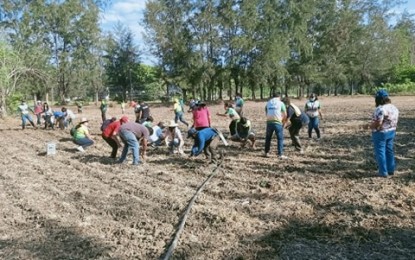
FOOD SECURITY. University officials plant six varieties of crops to kick off the "Plant, Plant, Plant" program of the government. A ceremonial planting was held on Wednesday (May 6, 2020) at a farm west of the College of Agriculture, Food and Sustainable Development to showcase its best practices on sustainable food production. (Photo by Reynaldo E. Andres)
BATAC CITY – Officials of the Mariano Marcos State University (MMSU) here have designated parts of the school’s crop production area for the "Plant, Plant, Plant" program to ensure there would be enough food supply during and after the coronavirus disease (Covid-19) health crisis.
A ceremonial planting activity dubbed “Pangontra iti Epekto ti Covid-19: Agmulatayo,” was held on Wednesday at the College of Agriculture, Food and Sustainable Development (CAFSD) that serves as a model farm for faculty, students, and villagers near the MMSU campus, and a ready source of organically-grown products.
“This ‘Plant, Plant, Plant’ program will be implemented not only in the Batac City campus, but also in campuses of MMSU where the general community quarantine is being enforced,” said MMSU president Shirley C. Agrupis, who led the planting of six varieties of crops such as tomato, eggplant, pepper, okra, pole sitao, and patola (sponge gourd).
“We are happy to implement this activity that is being advocated by President Rodrigo Roa Duterte, though the Department of Agriculture (DA) in order to increase the university’s food adequacy level during this Covid-19 pandemic,” Agrupis said.
She said the activity also aimed to raise awareness on the importance of planting vegetables and other crops for a ready supply of organic foods that would help boost the immune system.
Last April 27 and 29, the university distributed rice and vegetable seeds to 1,000 families in various towns of Ilocos Norte who are affected by the enhanced community quarantine (ECQ).
This initiative was part of the Science-based Emergency Assistance Project being implemented by the MMSU’s research and extension directorates and funded by the Philippine Council for Agriculture, Aquatic and Natural Resources Research and Development of the Department of Science and Technology (DOST-PCAARRD).
Earlier, Agriculture Secretary William D. Dar reiterated the government’s commitment to providing adequate, accessible and affordable food for every Filipino family through the "Plant, Plant, Plant" program, which is the DA’s centerpiece initiative to ensure sustained food production and availability, food accessibility and affordability amid the threats of Covid-19.
After the activity, Agrupis assured the MMSU community that there is enough food supply from various university food production projects based on the current rice inventory in its palay warehouse, and livestock inventory in the poultry and piggery projects.
“In our poultry project, we have enough supply of native chickens towards the lean months,” she said, adding that the fruit-bearing trees such as mango and duhat, are also major sources of additional income of farm employees. (PNA)
